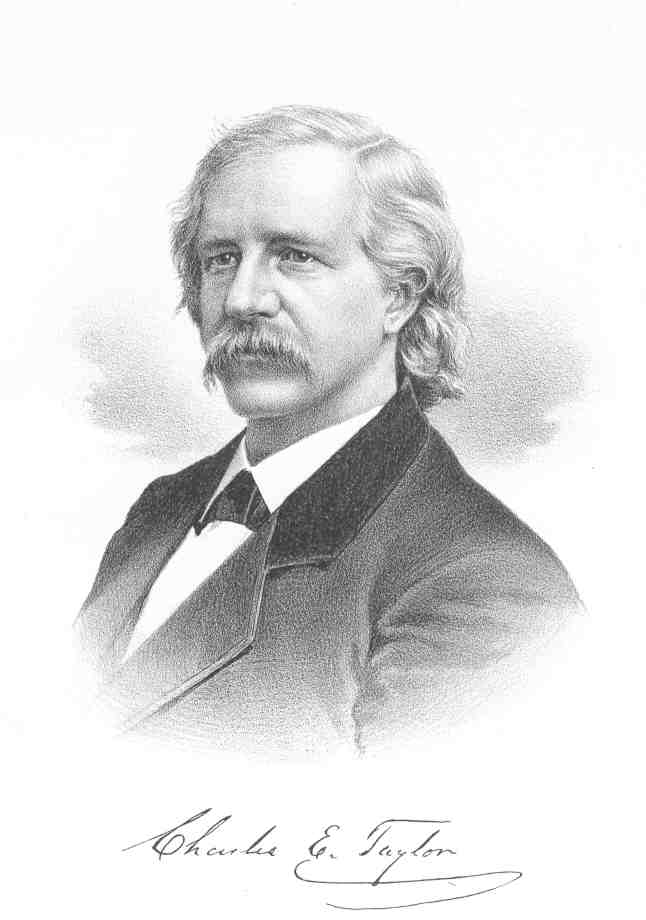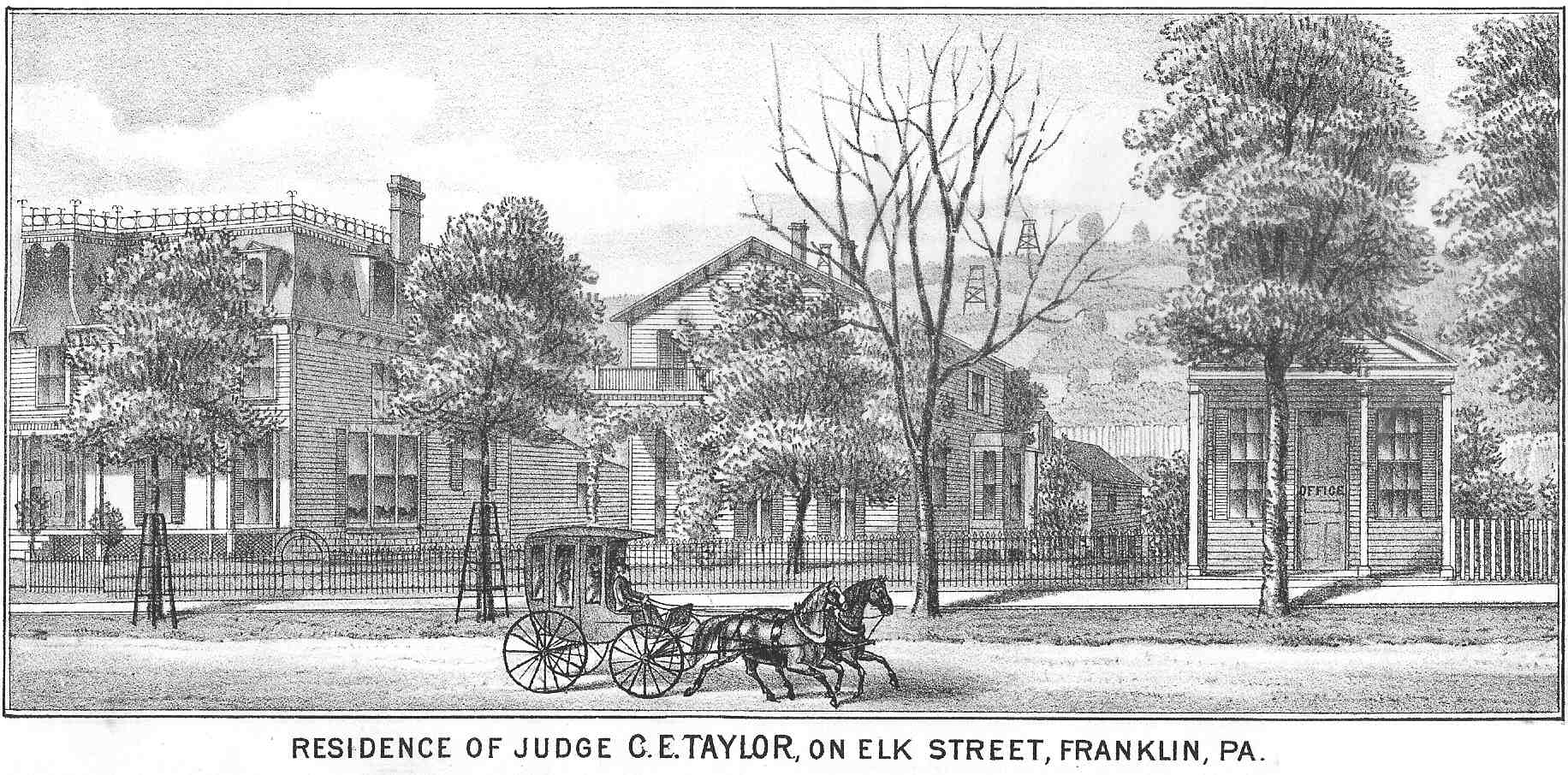Husband Judge Charles E. Taylor 1 2

Born: 4 Sep 1826 - Hampshire Co, MA 3
Christened:
Died:
Buried: 21 Feb 1901 - Franklin Cemetery, Franklin, Venango Co, PA
Father: Edmund Taylor ( - ) 3
Mother: Theodosia Clark ( - ) 3
Marriage: 1846 3
Other Spouse: Susan Julia Mackey ( - ) 1 2 4

• Residence: : Franklin, Venango Co, PA.
Wife Jane McWilliams 3
Born:
Christened:
Died: Abt 1847
Buried:
Father: John McWilliams ( - ) 3
Mother:
Children
1 M John Taylor
Born: Abt 1847
Christened:
Died:
Buried:
General Notes: Husband - Judge Charles E. Taylor
He became president judge of the twenty-eighth judicial district after the resignation of Judge Trunkey, in December, 1877. In childhood he removed from Hampshire County, Massachusetts, with his parents to Cleveland, Ohio, where he lived until his father's death, when his mother located in Mercer County, Pennsylvania. He learned the painter's trade, and followed that vocation for many years. In 1850 Mr. Taylor came to Franklin, Pennsylvania, where he continued to work at his trade, and subsequently worked at Clarion, Pennsylvania, later returning to Franklin.
In 1856 he commenced reading law under McCormick & Kerr, of Franklin. His evenings were spent in the acquirement of legal knowledge, while supporting his family by working at his trade during the daytime. Thus under discouraging difficulties he obtained his first knowledge of the law. His early education consisted of only a few years during his boyhood in the common schools, and this was a great drawback to him while pursuing his legal studies. Yet with dogged tenacity he remained firm in his resolve to become a lawyer, and on the 27th of April, 1858, he was admitted to the bar. He immediately hung out his shingle, and in due time grew into a fair practice. In the fall of 1859 he was elected on the Democratic ticket as district attorney, and was still filling that position when the civil war began.
In the summer of 1861 he commenced raising a company for the Fourth Pennsylvania Cavalry, and was mustered into that regiment as captain of Company I the following October. He participated in the Seven Days' campaign before Richmond, and while on a reconnaissance from Harrison's Landing was wounded. After the evacuation of that base of operations, Captain Taylor was sent to the hospital at Point Lookout, Maryland, where he was honorably discharged from the service, October 4, 1862, because of disability to perform further military duty. This fact was attested by the attending surgeon and every officer of his regiment.
On his return to Franklin he formed a partnership with Calvin W. Gilfillan, which continued about five years. During this period the firm of Taylor & Gilfillan did a very extensive legal business, and was recognized as one of the prominent firms at this bar. In the meantime Captain Taylor's brother-in-law, Charles W. Mackey, had been admitted as a member of the firm, and when Mr. Gilfillan retired Taylor & Mackey continued the large practice that had been built up through the passing years.
When the civil war broke out Judge Taylor was an ardent unionist, and was one of the thirty-four Democratic delegates of Pennsylvania who attended the peace congress at Washington during that exciting period in our national history. The efforts of this congress to prevent war proved a failure, and he subsequently cast his political fortunes with the Republican party, and thereafter was an unswerving supporter of its candidates, its measures, and its principles.
In 1866 he was the nominee of the Venango Republicans for the judgeship. But the Republicans of Mercer county also had a candidate in the field that year, and both were beaten by John Trunkey, the Democratic nominee. In 1876 he and Judge Trunkey were the respective candidates of their parties for the judgeship, and he was again defeated. In December, 1877, he was appointed to fill the vacancy on the bench caused by the resignation of Judge Trunkey, and November 5, 1878, he was elected to the same position, and was re-elected as his own successor, November 6, 1888, by the largest majority ever given in Venango county.
Before his appointment to the bench Judge Taylor was recognized as a bright, able lawyer, particularly so in the celerity which he exhibited in discovering the leading features involved, and the clearness and determined persistence with which he presented and prosecuted his plea. He laid no claim to being a dignified, great, or brilliant jurist, but he possessed a naturally quick intuition that seldom failed to grasp the most intricate points of the case at issue, and, being a hard student, he was always able to support his views and decisions with recognized precedents and authorities. A man of positive views and convictions, and never afraid to express them, it would indeed be strange if he had no enemies; but the large majorities by which he has been placed upon the bench in two successive elections were incontrovertible evidence of his popularity among the people of Venango county. Judge Taylor was a charter member of Mays Post, G. A. R., and was a member of the Masonic lodge of Franklin. [HVC 1890, 167]